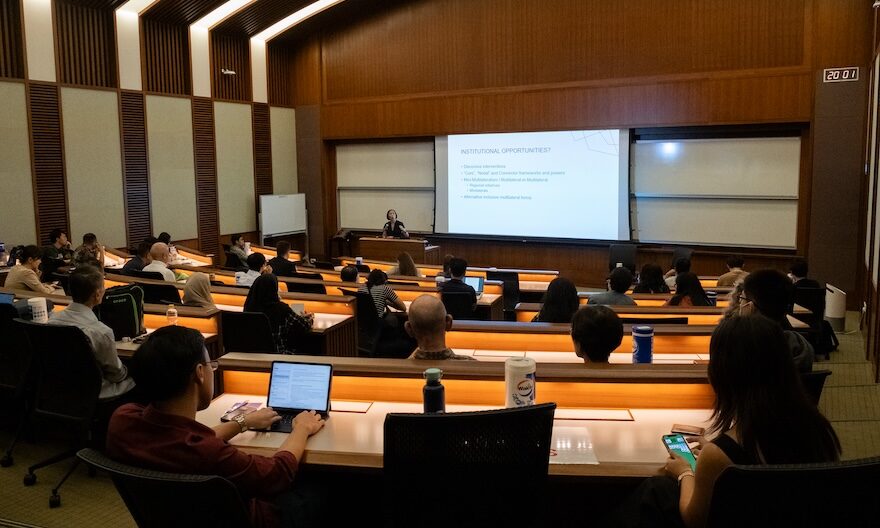The enduring paradox of US-China relations

The United States and China – unmistakably two of the most prominent nations in the world today – have a power struggle that seems ever-growing. However, some scholars are optimistic about the situation, including Professor Bates Gill.
Professor Gill is a renowned China expert with a 25-year international career as a scholar, policy advisor and institution-builder. He is currently Director of China Matters, a not-for-profit advisory based in Sydney, and a Visiting Professor with the United States Studies Centre at the University of Sydney. On 13 January, Professor Gill delivered a public lecture at Yale-NUS, which discussed the enduring paradox of US-China relations, and provided insights on the past, present and potential future situation of the relationship.
First highlighting the importance of US-China relations, Professor Gill deemed it as “the most important and consequential bilateral relationship”, that will determine the region’s security and prosperity ahead. With China as a rising powerhouse contesting the US presence in Asia, US-China relations are fraught with increasing tension.
Unpacking the paradox, Professor Gill explained:
“The two countries have never been so interdependent, or shared as much global relations – but they are also at odds.”
Tapping on his expertise, Professor Gill largely focused on addressing the issue from China’s perspective, looking at the drivers and constraints of China’s foreign policy. Contrary to the overall pessimism in the media and amongst scholars on the problematic US-China relations, Professor Gill instead emphasised the positive aspects, to tell the “untold success story” of the relationship.
He touched on three major drivers of China’s foreign and security policy, namely the historical struggle of what he termed ‘geo-demography’; aggrieved nationalism; and China’s growing wealth and power. Explaining each of these major drivers in greater detail during his talk, he sought to provide insight on the direction of China’s policy, and why this upsets their American counterparts. Professor Gill also raised in his talk, four strategic constraints China faces, which has helped her to ensure that the tensions are kept in check despite their existence.
Overall, he found that the US-China relations can be “defined by a conclusive sense of schizophrenia”, where it swings between tension and interdependence – at times close, and at times bitterly hostile. Effectively, the drivers and constraints resulted in a situation that Professor Gill found best explained by the French phrase “plus ça change, plus c’est la même chose” or the Chinese phrase “越变越是老样子” which loosely translates to “the more something changes, the more it stays the same”.
Professor Gill championed placing more emphasis on the current positive aspects of the relationship, which include unprecedented government interactions, military ties, trade and investment relations as well as people-to-people exchanges, in terms of tourism, education and science, between the two superpowers.
This public lecture by Professor Gill was held under the auspices of the Tan Chin Tuan Chinese Culture and Civilisation Programme, which aims to increase the understanding of China and Chinese culture amongst the students at Yale-NUS College. The Tan Chin Tuan Foundation also supports Yale-NUS’ Chinese Language Scholarship Programme and co-curricular activities which help deepen our students’ knowledge of China.
Professor Gill’s talk can be viewed here . More talks and lectures delivered at Yale-NUS can be found on the Yale-NUS College’s Youtube channel and other upcoming events can be found here .




